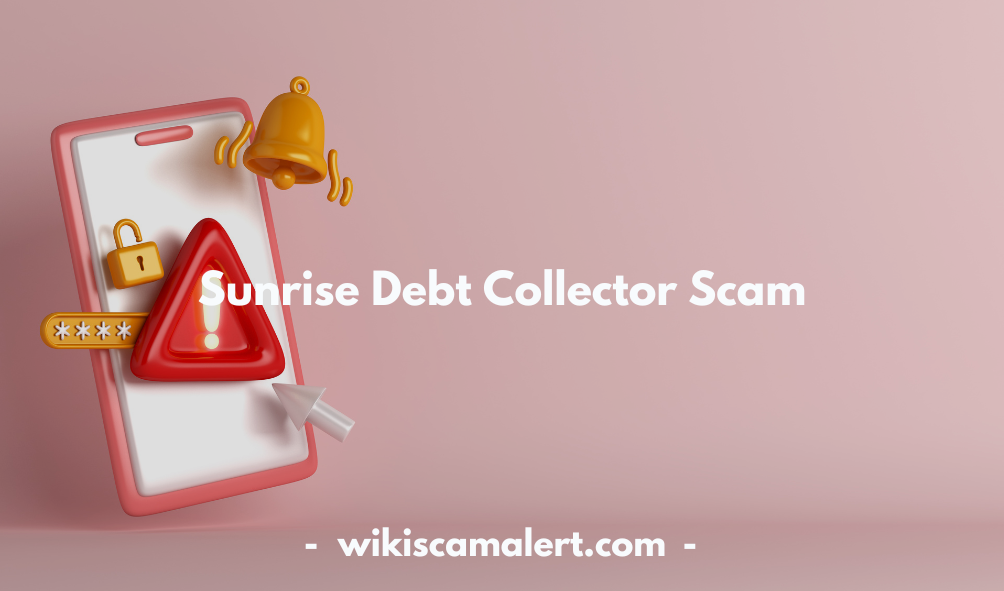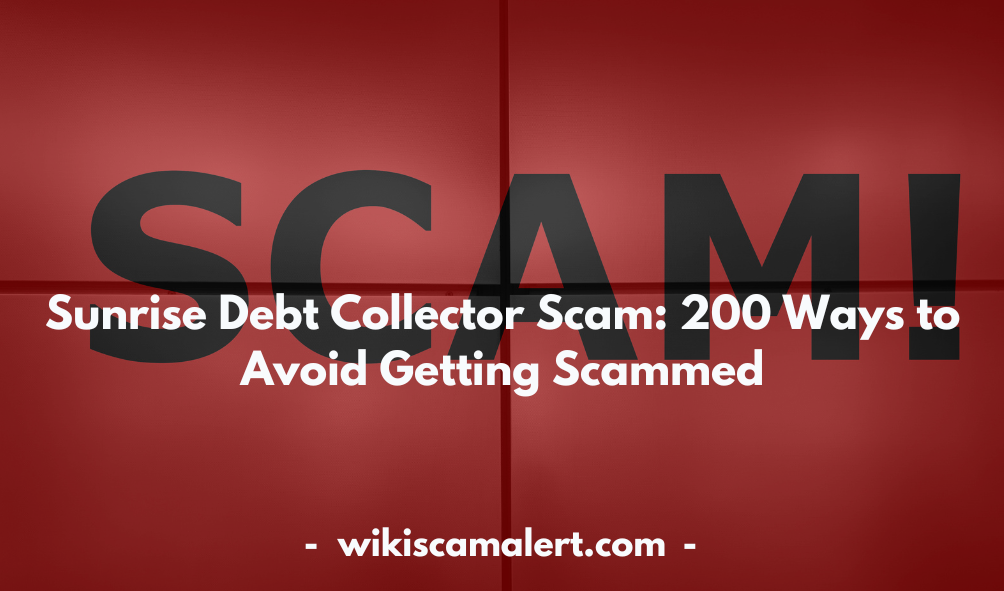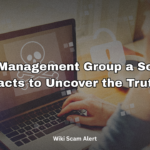Have you received a suspicious call or text message claiming you owe money to a debt collection agency? You might be dealing with the Sunrise Debt Collector Scam. Scammers are getting more sophisticated, tricking people into paying debts they don’t even owe. If you’ve been contacted, don’t panic—we’re here to help you spot the scam, avoid falling victim, and take action against these fraudsters.

Sunrise Debt Collector Scam Overview
- What is the Sunrise Debt Collector Scam? – Explanation of the fraudulent debt collection scheme.
- How It Operates – Scammers impersonate legitimate collectors to trick victims.
- Who Is Targeted? – Individuals with outstanding loans or those unaware of their debt status.
- Methods Used – Fake phone calls, threatening messages, and phishing emails.
- Common Red Flags – Demands for immediate payment and refusal to provide proof of debt.
- Financial Impact – Victims lose thousands of dollars to fake debt collectors.
- Legal Implications – Scammers violate consumer protection laws like the FDCPA.
- How to Identify a Scam – Recognizing fraud through inconsistent details and scare tactics.
- Connection to Other Scams – Links between fake debt collections and identity theft.
- How to Stay Safe – Steps to protect yourself from falling victim to scams.
Sunrise Debt Collector Scam Warning Signs
- Unsolicited Contact – Receiving unexpected phone calls or texts about a debt you don’t recognize.
- Urgent Payment Requests – Scammers pressure victims into making immediate payments.
- No Proof of Debt – Legitimate collectors must provide written verification of debt upon request.
- Threatening Behavior – Scammers may claim they will take legal action or have you arrested.
- Demanding Unusual Payment Methods – Requests for payment via gift cards, cryptocurrency, or wire transfers.
- Caller ID Spoofing – Fake numbers that appear to be from real agencies.
- Unfamiliar Company Name – Scammers use generic or non-existent business names.
- Refusal to Answer Questions – Evasive responses when asked for detailed information.
- Robocalls and Pre-Recorded Messages – Automated calls warning of debt-related consequences.
- Fake Legal Documents – Forged letters attempting to appear as official debt collection notices.
Sunrise Debt Collector Scam Investigation
- Ongoing Investigations by Authorities – The FTC and CFPB track fraudulent debt collection operations.
- Lawsuits Against Fake Collectors – Legal actions taken against scam organizations.
- How Scammers Obtain Victims’ Information – Data breaches, phishing, and social engineering.
- FBI Reports on Debt Collection Fraud – Case studies of fraudsters posing as collectors.
- Use of Technology in Scamming – How scammers manipulate caller IDs and digital payment systems.
- Victim Testimonies – First-hand accounts of those who lost money to fake collectors.
- Global Reach of the Scam – How international fraudsters target U.S. citizens.
- State-Level Crackdowns – Efforts by state attorneys general to shut down fraudulent operations.
- How Banks Handle Fraudulent Debt Payments – Steps financial institutions take to prevent unauthorized transactions.
- Red Flags Found in Investigation Reports – Key findings from government and private sector probes.
Sunrise Debt Collector Scam Reviews
- Negative Online Reviews – Reports from individuals who encountered fake debt collectors.
- Better Business Bureau (BBB) Complaints – Ratings and complaints against fraudulent companies.
- Trustpilot and ConsumerAffairs Feedback – What people are saying about scam calls.
- Social Media Discussions – How victims share their experiences on platforms like Reddit and Facebook.
- YouTube Warnings from Scam Busters – Experts exposing fake debt collection schemes.
- Comparison to Legitimate Debt Collectors – Differences between real and fake agencies.
- Patterns Found in Scam Reports – Common phrases and tactics used by fraudsters.
- How Victims Recovered Their Money – Steps taken to get refunds or dispute payments.
- Legal Experts Weigh In – Lawyers discussing the illegitimacy of certain debt collection claims.
- Common Locations for Scam Operations – Which regions have the highest number of fraud reports.
Sunrise Debt Collector Scam Complaints
- Common Complaints Filed with the FTC – Top concerns reported to the Federal Trade Commission.
- How to File a Complaint Against a Fake Collector – Steps to report fraud.
- Complaints on Consumer Protection Websites – Reports on sites like Ripoff Report and ScamPulse.
- Credit Reporting Issues – Victims facing false debt claims on their credit reports.
- Emotional Distress of Victims – Psychological effects of harassment and threats.
- Attempts to Collect Nonexistent Debts – Victims receiving collection notices for debts they never owed.
- Law Enforcement Response to Complaints – How police and consumer protection agencies address fraud cases.
- Fraudulent Collection Calls at Work – Scammers attempting to embarrass victims by calling their employers.
- How Complaints Have Led to Scam Busts – Reports that helped authorities catch fraudulent collectors.
- Delayed Responses from Financial Institutions – Banks and credit agencies sometimes failing to act quickly.
Sunrise Debt Collector Scam Legal Actions
- Lawsuits filed against fraudulent debt collection agencies
- Federal Trade Commission (FTC) actions against scam collectors
- Consumer Financial Protection Bureau (CFPB) regulations on fake debt collectors
- State attorney general investigations into Sunrise Debt Collector Scam
- Class-action lawsuits from scam victims
- Court rulings against illegitimate debt collection practices
- Legal rights under the Fair Debt Collection Practices Act (FDCPA)
- How victims can file a complaint with legal authorities
- Recent cases of scam debt collectors being shut down
- Steps to take if you receive a court notice from a fake collector
Sunrise Debt Collector Scam Prevention Tips
- Verify any debt collector’s legitimacy before making payments
- Request a written validation notice for the alleged debt
- Never provide personal or financial information over the phone
- Avoid making payments through untraceable methods like gift cards or wire transfers
- Register your number on the Do Not Call list to reduce scam calls
- Use call-blocking apps to filter out potential scam numbers
- Educate yourself on common debt collection scams and tactics
- Report suspicious debt collection calls to the FTC and CFPB
- Check your credit report to ensure there are no fraudulent debts in your name
- Consult a lawyer if you’re being harassed by a fake debt collector
Sunrise Debt Collector Scam Victim Stories
- A woman lost $2,000 after believing a scammer’s threats
- A man received fake legal notices demanding immediate payment
- How a victim uncovered the scam by contacting the original creditor
- A retired couple was pressured into making a fraudulent payment
- A college student received a threatening call about non-existent student loan debt
- A scammer used spoofed numbers to impersonate law enforcement
- How one victim successfully sued a fake debt collection company
- A victim avoided the scam by recognizing red flags early
- An elderly man was repeatedly called and harassed by a scammer
- A person’s identity was stolen and used in fake debt collection scams
Sunrise Debt Collector Scam Phone Calls
- Common phone numbers associated with the Sunrise Debt Collector Scam
- How scammers use robocalls to reach victims
- Tactics scammers use to sound legitimate over the phone
- Recorded scam call examples and breakdowns
- Steps to take if you receive a suspicious debt collection call
- How scammers spoof caller ID to appear official
- What to say (and not say) when a scam debt collector calls
- How to report scam phone calls to authorities
- How to block scam debt collection numbers on your phone
- Legal actions against scammers making fraudulent calls
Sunrise Debt Collector Scam Text Messages
- Common scam text messages used by fake debt collectors
- How to identify a fraudulent debt collection text
- What to do if you receive a suspicious text message about debt
- How scammers use SMS phishing to steal information
- Examples of real scam debt collection texts reported by victims
- Why you should never click links in unknown text messages
- How to report scam debt collection texts to authorities
- How scammers use text messages to create a sense of urgency
- How to block and filter scam texts on your phone
- The role of mobile carriers in stopping scam text messages
Sunrise Debt Collector Scam Payment Demands
- Immediate Payment Pressure – Scammers insist on urgent payments to create panic.
- Unusual Payment Methods – They demand payments via gift cards, cryptocurrency, or wire transfers.
- No Official Invoice – Victims never receive a formal debt statement before being asked to pay.
- Fake Settlements – Scammers offer a discount if you pay immediately, making it seem like a good deal.
- Threatening to Increase Debt – They claim that failure to pay will result in higher interest or fees.
- Demanding Personal Financial Details – Asking for bank account numbers or credit card information.
- Refusal to Provide Written Proof – Legitimate debt collectors must provide documentation; scammers avoid this.
- Fake Payment Confirmation Messages – Victims receive bogus receipts after payments.
- Calls at Odd Hours – Scammers may contact victims at night or early morning to avoid detection.
- Repeated Harassment – They keep calling or messaging until the victim agrees to pay.
Sunrise Debt Collector Scam Fake Documents
- Forged Debt Notices – Victims receive emails or letters that appear official but contain false information.
- Bogus Legal Threats – Documents claim that a lawsuit has been filed against the victim.
- Fake Court Orders – Some scammers create fraudulent court documents to intimidate victims.
- Impersonating Government Agencies – They send letters with fake logos of the IRS or FTC.
- Counterfeit Payment Receipts – Some victims receive fake receipts after making a payment.
- False Debt Verification Notices – If asked for proof, scammers send made-up documentation.
- Forged Collection Agency Letters – Scammers copy real agency letterheads to appear legitimate.
- Misleading Settlement Offers – Victims receive letters offering “one-time” payment deals to clear the debt.
- Manipulated Credit Report Notices – Fake documents claim non-payment will damage credit scores.
- Unsigned or Unverified Documents – Many of these fake letters have no official signature or contact details.
Sunrise Debt Collector Scam Threats and Harassment
- Threatening Arrest – Scammers falsely claim that non-payment will lead to jail time.
- Harassment via Calls and Texts – Victims report excessive calls and messages daily.
- Threats to Contact Employers – Scammers may say they will inform your workplace about the “debt.”
- Violent or Abusive Language – Some scammers yell, curse, or intimidate victims.
- Claiming a Lawsuit Has Been Filed – They try to scare victims by falsely claiming a legal case exists.
- Threatening to Garnish Wages – Victims are told their paychecks will be reduced if they don’t pay.
- Fake Sheriff or Police Calls – Scammers pretend to be law enforcement officers to add pressure.
- Harassment of Family Members – Calls may be made to relatives, claiming they must pay the debt.
- Spoofed Caller ID Numbers – Scammers make their calls appear as though they are from a real agency.
- Threats of Public Exposure – They claim they will make the debt public if unpaid.
Sunrise Debt Collector Scam Reporting Guide
- Report to the FTC – File a complaint at www.ftc.gov.
- Contact the CFPB – The Consumer Financial Protection Bureau investigates scams (www.consumerfinance.gov).
- Notify Your State Attorney General – Each state has offices to handle fraud cases.
- File a Complaint with the BBB – The Better Business Bureau tracks scam debt collectors.
- Report to the Police – If threats or harassment occur, contact local law enforcement.
- Check Your Credit Report – Request a free credit report at www.annualcreditreport.com to verify any debts.
- Use the Do Not Call Registry – Register your number at www.donotcall.gov to block unwanted calls.
- Warn Others Online – Share your experience on scam alert websites and social media.
- Block Scam Callers – Use your phone’s settings or third-party apps to stop further calls.
- Seek Legal Assistance – If you suffer financial harm, consult a consumer protection lawyer.
Sunrise Debt Collector Scam Consumer Rights
- Fair Debt Collection Practices Act (FDCPA) – Protects consumers from abusive debt collection practices.
- Right to Request Debt Validation – You have the right to ask for written proof of any debt.
- No Harassment or Threats Allowed – Debt collectors cannot legally threaten or abuse you.
- Time Restrictions on Collection Calls – Calls must be made only between 8 AM and 9 PM.
- No False Claims or Misrepresentations – Collectors cannot lie about being law enforcement or attorneys.
- Right to Dispute a Debt – If you believe a debt is incorrect, you can challenge it in writing.
- No Contact with Third Parties – Collectors cannot legally disclose your debt to family, friends, or employers.
- Right to Stop Communications – You can request a collector to stop contacting you.
- No Unauthorized Fees – They cannot charge additional fees beyond what was originally agreed.
- Ability to Sue for Violations – If a debt collector violates your rights, you can take legal action.
Sunrise Debt Collector Scam Financial Impact
- Loss of money due to fraudulent debt payments.
- Damage to credit scores from false debt reports.
- Emotional stress and anxiety over fake debt claims.
- Increased risk of identity theft from sharing personal information.
- Unnecessary legal fees if victims attempt to dispute fake debts.
- Financial strain due to rushed or coerced payments.
- Time lost in resolving false claims and reporting fraud.
- Potential job-related consequences if credit checks are affected.
- Difficulty obtaining future loans or financial services.
- Extra expenses incurred to secure personal and financial information.
Sunrise Debt Collector Scam Law Enforcement Involvement
- Federal Trade Commission (FTC) investigations into fraudulent debt collection practices.
- FBI involvement in large-scale scam operations.
- Local law enforcement tracking scam reports and fraud cases.
- Consumer Financial Protection Bureau (CFPB) handling complaints.
- Legal actions against scammers posing as debt collectors.
- Collaboration between law enforcement and financial institutions to prevent fraud.
- Arrests and prosecutions of scammers when possible.
- Public warnings issued by government agencies.
- Cybercrime units monitoring scam activities online.
- Strengthening regulations and laws to combat fake debt collection schemes.
Sunrise Debt Collector Scam Media Coverage
- News reports exposing the scam on television and online media.
- Consumer protection agencies releasing alerts and warnings.
- Victim interviews sharing personal experiences.
- Investigative journalism uncovering scam networks.
- Social media awareness campaigns spreading warnings.
- YouTube videos explaining the scam and how to avoid it.
- Blog posts by financial experts advising on fraud prevention.
- Podcasts discussing real-life scam cases and their impact.
- Legal experts analyzing the consequences of fraudulent debt collection.
- Forums and discussion boards where victims share their stories.
Sunrise Debt Collector Scam Recovery Steps
- Stop communication with the scammer immediately.
- Report the scam to the FTC, CFPB, and local authorities.
- Freeze your credit and monitor financial statements.
- Contact your bank to block or dispute any payments made.
- Change passwords and security settings if personal details were shared.
- Educate yourself on legitimate debt collection processes.
- Alert family and friends to prevent further victims.
- Seek legal advice if necessary to restore credit status.
- Use identity theft protection services if data was compromised.
- Stay vigilant for future scam attempts and fraud warnings.
Sunrise Debt Collector Scam Awareness and Education
- Learning about common debt collection scam tactics.
- Understanding your rights under the Fair Debt Collection Practices Act (FDCPA).
- Recognizing the signs of fraudulent debt collectors.
- Teaching family members how to avoid scam calls and texts.
- Spreading awareness through social media and online forums.
- Attending workshops or webinars on financial fraud prevention.
- Reading consumer protection guides from official agencies.
- Reporting scam attempts to authorities to help track fraudsters.
- Encouraging businesses to implement stronger fraud detection measures.
- Promoting financial literacy to reduce vulnerability to scams.
How to Protect Yourself from the Sunrise Debt Collector Scam
- Never pay a debt without verification.
- Ask for a debt validation letter.
- Contact the original creditor directly.
- Block scam numbers and report them.
What to Do If You’ve Been Targeted by This Scam?
- Do not engage with the scammer.
- Report the incident to the FTC and CFPB.
- Monitor your credit report for fraudulent activity.
- Educate others to prevent further scams.
Conclusion
The Sunrise Debt Collector Scam is just one of many fraudulent debt collection schemes designed to exploit unsuspecting individuals. By staying informed, recognizing the warning signs, and knowing your rights, you can protect yourself and others from falling victim. To learn more about another concerning debt collection issue, check out this detailed warning about Paragon Revenue Group Debt Collection.
FAQs
How can I verify if a debt collector is real?
Ask for their company details and check with the original creditor.
What should I do if I receive a suspicious debt collection call?
Do not engage, ask for written proof, and report the call.
Can scammers take legal action against me?
No, scammers have no legal power over you.
How do I block fake debt collectors from contacting me?
Use call-blocking apps and register on the Do Not Call list.
Are there any tools to report and track scam calls?
Yes, websites like ScamTracker and FCC complaint center can help.










